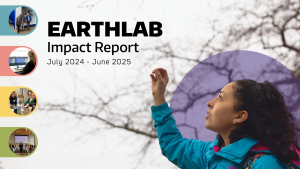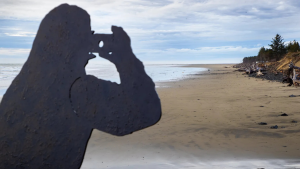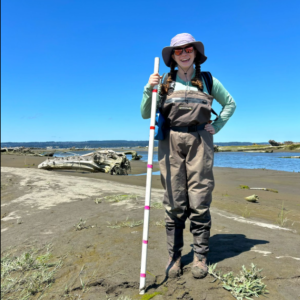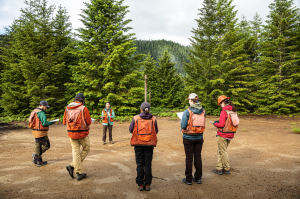Our Impact
From Roadmap to Reality
Our 2025-2028 Strategic Plan serves as our north star: a shared commitment that aligns our diverse partners, from Tribes and nonprofits to students and faculty, around a common vision for climate action. In times of uncertainty, this roadmap helps us make decisions that honor both our mission and the communities we serve.
Our annual impact reports show how we’re turning that vision into reality, documenting tangible progress toward our strategic priorities through trust-based partnerships, innovative research, and student leadership development.
Since our founding in 2017, EarthLab has served as both research engine and community catalyst, harnessing the power of co-created solutions to our most urgent environmental challenges. Our work is grounded in trust, equity, and the belief that transformative climate solutions emerge when different sectors, disciplines, and knowledge systems work together.
Our Latest Impact Report
2025 — Highlighting Community-Led Climate Solutions and Resilience
Fiscal Year 2025 (July 1, 2024 – June 30, 2025)
FY2025: Strategic Priorities in Action
Investing in Research Co-Created with Community
When we launched the Innovation Grants Program in 2018, our “high-risk, high-reward” model addressed a gap we saw in academic funding: supporting applied, interdisciplinary, and early-stage research that centered community needs and participation. There has always been high interest in this type of funding: in the first year alone, over 30 teams applied and 5 were selected. Since then, we have awarded nearly $2M to 29 teams with high potential for impact. Many of our grantees sustain their projects or partnerships long after our funding, including this year’s featured Coastlines – Camera – Action case study.
After five cohorts, we took this past year to benchmark our program against similar models, steward 14 active grants toward completion, and conduct a thorough evaluation to inform our future direction. During this process, one thing became very clear: complex problems require multi-pronged solutions. As one respondent shared, “you need money to buy time, which enables relationship building.” Other organizations showed that the most successful programs were able to offer multiple levels of funding and support, because they had a variety of resources to do so.
Put simply: Innovation in 2025 looks different than it did in 2018. This learning will shape the next chapter of EarthLab’s granting, especially as we balance deep relationship building with the rapid responses that acute environmental challenges demand in this moment.
In early 2026, we’ll launch two new funding opportunities designed to meet different needs at different speeds. Because if there’s one thing the last five years has shown us, it’s that saying ‘yes’ in only one way means saying ‘no’ to too many brilliant possibilities. Together, our new approaches will let us say ‘yes’ more often, in more ways, to the transformative ideas our planet urgently needs.
Case Study | Coastlines – Camera – Action: How community science has monitored and informed solutions to beach erosion

In 2016, North Cove, Washington was home to one of the fastest-eroding coastlines in the world. When residents were told that there was no money to invest in saving their coastline, David Cottrell (a cranberry farmer and commissioner of Pacific County Drainage District No. 1) began looking for other solutions.
Cottrell and his partner Connie Allen, alongside their neighbors, created a community-led activist organization called Wash Away No More. Together with the Willapa Erosion Control Action Now (WECAN) community forum, founded by the Shoalwater Bay Indian Tribe (SBIT), North Cove residents obtained grants to create a two kilometer stretch of dynamic revetment* in December 2018. This work not only held, but actually built back parts of the lost shoreline. By 2024, a total of 1.1 miles of shoreline along the north entrance to Willapa Bay had been restored.
Together with SBIT, WECAN, and Wash Away No More, UW oceanography and public health researchers applied for an EarthLab Innovation Grant in 2023. The goal was to build on the community’s initial success by combining science, engineering, art, and photography with community input. The team used their funding to provide space for community voices to shape future research that could help protect their coastline, and upgrade existing photo stations using CoastSnap, a scientific tool that measures beach changes from photos. Since the photo station relaunch, North Cove residents have submitted more than 700 photos via MyCoast, revealing subtler storm-by-storm pattern changes that would have been impossible for traditional seasonal shoreline monitoring to detect.
By thoughtfully enhancing community-based monitoring systems, this project created direct opportunities for community voices to be heard so that local solutions can be backed by both science and lived experience. In winter 2025, this team was awarded an additional two years of funding from Washington Sea Grant to continue growing their body of work.
Training and Mentoring Tomorrow’s Climate Leaders
A 2024 Lancet study found that 85% of young Americans are worried about climate change, with nearly 40% reporting that this anxiety impacts their day-to-day mental health. But research also shows that when we allow ourselves to name our anxieties, we reduce their power and become braver in the process. At EarthLab’s Summer Internship Program, students are given the space to transform their passion for climate into concrete action.
In addition to competitive site placements, interns gather for four hours per week to participate in EarthLab-specific cohort programming. Together, interns expand their knowledge around climate and environmental justice, spend time in community with each other, and learn from their peers from different majors and lived experiences, as well as build career development skills they can take with them into the future.
Conversations across campus have shown that our internship model’s core elements – consistent mentorship, peer connections, and authentic opportunities to engage in climate justice work – offer some of the most meaningful experiences for students during their time at UW. Across the last four years, our roughly 5% acceptance rate tells us that we’ve tapped into something that students genuinely want. But it also means that we’re only reaching a fraction of interested students, and supporting more students requires more resources.
In the meantime, thoughtful partnerships are part of our growth strategy. Together with the Program on the Environment, we co-sponsor an environmental justice seminar open to undergraduate UW students in any major. Alongside guest speakers and community organizers, students get to explore firsthand how grassroots coalitions shape policy and drive lasting, equitable climate solutions.
Case Study | NextGen Narratives: Stories of climate action by students, for students

Being part of one of the world’s top ten universities means that we hear a lot about how today’s students are tomorrow’s leaders. But what’s left unsaid in this saying is that current college students have lived through more climate disasters than any other generation in history. Their leadership tomorrow will be shaped by experiences we’re only beginning to understand today.
That’s exactly why we created NextGen Narratives.
Written by and for UW students, this EarthLab blog series is a platform to explore what equitable climate action and hope can look like. Because although climate change impacts all of us, it doesn’t impact everyone equally. A student from Eastern Washington has a different story than one from Seattle. A sociology major brings perspectives to the climate conversation that a computer science major might not have otherwise considered, and vice versa.
The process is straightforward: students pitch us story ideas that excite them — whether it’s a climate issue they’ve thought about for years or questions keeping them up at night. We pair them with a professional editor who helps them develop their voice and articulate their perspective for publication on both the EarthLab and College of the Environment websites, giving them both a meaningful platform to share their work and a valuable portfolio piece for future opportunities.
Through NextGen Narratives, we’re building a collection of voices that reflects the full complexity of how the next generation sees our shared future, with students starring as the experts of their own experiences. Their work reaches our more than 23,000 newsletter subscribers, amplifying the voices of the next generation beyond campus.
Expanding What is Possible for Environmental Research and Training
With nearly half of Washington state covered by forests, it’s hard not to stare up in wonder at the Douglas fir trees, western red cedars, and ponderosa pines around us. What goes unnoticed are the tree roots that live beneath our feet – communicating to each other through an intricate underground network of soil fungi called mycelium. In healthy forests, this network pools its resources (like water, nutrients, and carbon) to share with neighboring trees so that the forest can collectively thrive.
At EarthLab, our shared services model serves as the central network supporting and connecting our community of individual research centers into a more prosperous ecosystem. Like mycelium threading through forest soil, our team of 13 professional staff connects over 130 employees and researchers to the resources they need across the UW. By streamlining human resources, finance, grants, networking, fundraising, events, and communications, EarthLab affiliated researchers can focus on changing lives and livelihoods through their cutting edge science.
We’ve transformed from a novel experiment into essential infrastructure, serving as the underground network that keeps environmental research thriving when surface conditions grow harsh. With federal funding for climate resilience being drastically cut, uniquely symbiotic relationships like the EarthLab shared services model are more important than ever.
Supporting EarthLab means that you are effectively supporting a network of over 130 researchers and staff at a public institution that conducts more federally sponsored research than any other public university in the United States. Every dollar invested in our work amplifies research capacity across the different research centers we support, creating the collaborative foundation needed to address our most pressing climate challenges. Because when we work together, there’s so much more that we can do, and so much more that we stand to gain.
Case Study | Q&A with EarthLab grants manager Becca Hart on the ripple effect of administrative support across climate resilience research during difficult times

Federal funding for climate research has been cut dramatically since the beginning of this calendar year, and the federal landscape continues to be precarious. In the face of this uncertainty, grants manager Becca Hart and the entire EarthLab finance and administration team has stepped into a critical role in our shared services network — helping researchers rapidly pivot, find new resources, and keep vital environmental justice work alive.
We spoke with Becca about the impact of federal funding cuts on her work with member organizations and why administrative support has profound ripple effects across climate resilience efforts, especially during difficult times. A short excerpt from the interview is available below:
How have EarthLab member organizations been impacted by federal funding cuts? And what does it look like to lose federal funding?
Two of our member organizations have lost federal funding since February 2025. When a team loses federal funding, they receive an email notifying them that their award is being terminated. This means the work has to stop immediately. The impact of losing funding then goes out in ripples. One member organization had to lay off two positions, which was really difficult to see and had the most immediate impact. Sadly, the termination also ended funding for our partners and collaborators, creating a setback to them continuing this work.
How are you and the researchers you support responding to federal funding cuts?
In the case of one member organization, just a couple weeks after their award was terminated they found another opportunity that could support components of their work. They only had one week or so to submit the proposal, so it was a bit of a “drop everything” moment to get it completed.
While they got the scientific aspects of the proposal together, my role was to get all of the administrative pieces together so the proposal could get in as quickly and smoothly as possible.
Creating Connections at UW and in Community
In the last year, funding cuts, changes in capacity among community partners, and shifting attitudes toward climate work have stressed our efforts to engage with the UW and community. Yet these very pressures have revealed something powerful: when institutions retreat, relationships become our strongest foundation. In the face of these pressures, we’ve found connection by supporting work among students, staff, and faculty at the University of Washington.
Undergraduate passion for this work continues to surge. In the last year, we met with more than thirty groups across the UW, from the Campus Sustainability Fund to the Puget Sound Institute, and worked with a consultant to better understand how our summer internship program could serve both student learning and community needs beyond campus.
UW staff and faculty continue to show up for climate justice work. EarthLab and the nine member organizations under our organizational umbrella brought together more than 4,000 academics, students, policymakers and community partners in events tackling everything from ocean chemistry changes to wildfire response to the impacts of climate change on health.
By acting as a convener, organizer, facilitator, and participant, we’ve discovered that our role isn’t always to lead. Sometimes, it’s simply to make space. When budget cuts and staffing reductions could easily fragment our community, gathering people with shared purpose has created its own momentum.
Right now, we’re finding hope among our brilliant and imaginative community members who refuse to let constraints define what’s possible. Making space for creative climate solutions with other people is one of our most powerful assets. The work continues, and so do we.
Case Study | What we can learn from California’s wildfires: An event highlighting the importance of community in disaster preparedness

In the wake of the devastating Los Angeles wildfires in January 2025, the Center for Health and the Global Environment (CHanGE, an EarthLab member organization, wanted to host an event connecting L.A. area experts with practitioners across Washington state to share lessons learned and ideas for future work. However, with a small team and a changing landscape around community engagement due to federal budget cuts, it was unclear how this need could be met.
Working alongside CHanGE, the UW Center for Disaster Resilient Communities and the Population Health Initiative, the EarthLab communications staff turned this vision into reality. We helped hone the vision and target audience for the event, curated an expert speaker lineup, crafted marketing materials, and orchestrated the flow of the event. Our collaborative effort culminated in a successful two-hour hybrid event in May, bringing together more than 50 participants online and in-person.
The event featured four speakers – two wildfire experts from California, and two from Washington – and was moderated by Bradley Kramer, a public health expert from King County. The audience included policymakers at the local, county and state level, UW students and faculty, and community members.
The first half of the event was dedicated to a panel discussion, with topics ranging from the challenges inherent to collecting wildfire data to how to keep people safe in an emergency. The second half of the event invited panelists and audience members to discuss how the university community could increase resilience to wildfire preparedness and health impacts.
Events like these promote knowledge sharing and idea generation across academics and practitioners and are critical for developing solutions to climate-related disasters. Yet, community events are threatened due to budget cuts and decreased staff capacity. By curating these opportunities for discussion, we create the fertile conditions that allow solutions to flourish and grow.
Impact Report History
2024 Impact Report — Showcasing Early Achievements and Future Aspirations
Our first-ever impact report documenting initial progress
Support Our Impact
Sustainable climate action needs people from all backgrounds, disciplines, professions, and lived experiences. If our work resonates with you, please consider supporting us to help continue building trust-based climate solutions across Washington and beyond.
Other helpful links:
Subscribe to Our Newsletter
Explore Our 2025 – 2028 Strategic Plan